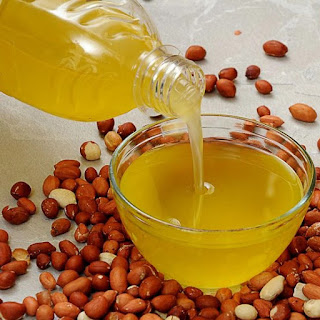Groundnut is a delicious, nutty, and aromatic cold-pressed cooking oil, and it was named Kalaya in ancient Ayurveda. This oil has been used throughout India for centuries. Compared to other nuts, such as almonds and walnuts, it has a high-quality nutritional profile in terms of taste, vitamins, and organic compounds that are good for you.
The high-fat content of groundnuts is offset by the fact that they are cholesterol-free. These beans are rich in healthy fats like monounsaturated and polyunsaturated fatty acids.
Though it has a mild nutty flavor, groundnut oil is a versatile and flavorless addition to many different meals. It can withstand the heat of up to 450 degrees Fahrenheit; it is perfect for deep frying.

The Many Ways That Groundnut Oil Can Improve Your Health
A tablespoon of peanut oil contains 119 calories, 14 grams of fat, 2 grams of saturated fat, and zero grams of protein, fiber, and sugar. Groundnut oil has a beneficial balance of omega-6 and fatty acids like oleic acid, linoleic acid, stearic acid, and palmitic acid, all of which help to improve metabolism and nerve function.
Considerable Health benefits
Research shows that incorporating groundnut oil into one's regular diet has many health benefits. Here, you'll find the reasons why groundnut oil is so beneficial to your health.
Better heart health
Having a high vitamin E content, groundnut oil contains heart-healthy unsaturated monounsaturated and polyunsaturated fats. There is evidence that replacing saturated fats with these unsaturated fats can lower the risk of cardiovascular disease.
If your vitamin E levels are low, your heart will be at greater risk from free radical damage. Resveratrol shields the heart and blood vessels by reducing blood pressure and cardiovascular stress.
Cuts down on cholesterol
Groundnut oil is highly recommended because of its beneficial effects on cholesterol levels, the primary factor contributing to severe heart conditions. Reducing cholesterol levels can aid in the avoidance of numerous health issues.
Unlike other oils, groundnut oil reduces harmful cholesterol levels due to its high concentration of plant sterols. Phytosterols reduce blood cholesterol by competing with cholesterol for absorption in the intestines.
Fatty acids increase the "good" HDL cholesterol, and the "bad" LDL cholesterol is decreased as a result. Atherosclerosis, which can worsen heart disease and increase the risk of stroke, has been linked to elevated LDL levels.

Controls Diabetes
According to some studies, consuming unsaturated fats may cause a further increase in glucose levels in people who already have diabetes. The effect of polyunsaturated fats on insulin secretion is similar to that of saturated fats.
In studies with oleic acid, researchers found that the body produced more insulin to counteract the inhibitory effect of insulin. Groundnut oil's high oleic acid content makes it a powerful tool in the fight against type 2 diabetes in females.
Aids in Preventing Cancer
It contains antioxidants that prevent cell death and damage from environmental toxins and free radicals. The vitamin E and phytochemicals in groundnut oil have been shown to have anti-inflammatory and anti-cancer effects.
Phytosterols and beta-sitosterol have been displayed in several studies to lower the risk of several cancers, including colon, prostate, and breast. Typical plant chemicals can halt the growth and spread of cancer and even kill cancer cells.
Reduces the risk of developing Alzheimer's disease
Niacin, vitamin E, and healthy unsaturated fats found in peanuts can help prevent cognitive decline and diseases like Alzheimer's by protecting against free radicals that damage neural pathways in the brain.
Resveratrol has therapeutic value because of its ability to improve memory and cognition, reduce the risk of developing Alzheimer's disease, and delay the onset of dementia.
With its balanced and abundant wellsprings of minerals, vitamins, and organic compounds that have been less sifted to keep up with the nutty attribute, Groundnut oil is an excellent choice for a healthy touch with an acute bland flavor. Now that celebrity nutritionists and dietitians are singing its praises; it is back on store shelves and ready to conquer the nutritional world.
Conclusion:
If you are looking for a healthy and natural way to take care of your skin, hair, and nails, consider using refined groundnut oil. This oil is rich in antioxidants, vitamins, and minerals that can help improve the appearance of your skin, hair, and nails. Call us now to buy Double-Filtered Groundnut Oil healthy cooking.
Comments
Post a Comment